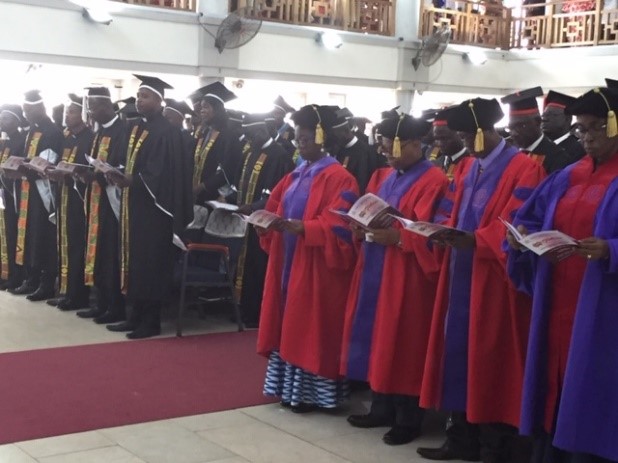By: Stewart Hoover
I’m writing from Ghana in West Africa. The air is heavy with humidity and rich smoky odors. I am here for a conference but I’m attending the graduation at Trinity Theological Seminary. In a pristine, passively ventilated chapel on a 90-degree 90-percent day, I’m struck by how exotic yet how familiar it all is. The world today is bound by its similarities as much as its differences, but I begin to see powerful possibilities for meaning in both.
The academic procession is just such a thing. It comes from the outside, where traditional drums have called the assembly and ushered the dignitaries and faculty into the hall. Inside, there is more familiar choral music in the background. The procession looks familiar. The faculty wear academic gowns from universities around the world, but the graduates’ gowns are trimmed with kente cloth in different hues depending on their degree. Like the drumming and choral hymns, the sight is not a mixture so much as it is a layering of different, yet parallel trajectories of meaning. This sense continues throughout the event. The last dignitary to enter is the traditional chief whose territory includes the seminary campus. He arrives in an elegant kente gown accompanied by his wife and two attendants. One carries a large golden staff topped with the image of a monkey—the talisman of his people and the land we sit on.
There are more hymns and scripture readings. And then the program begins. It represents Trinity’s location at a crossroads of geography and history. Its faculty have exceptional international credentials. It has been a leader in theological reflection on modern culture (why I have been invited there) and has been a pioneer in Africa in moving churches forward on mental health and substance abuse intervention.
The President’s remarks are striking—and could have easily been delivered in the U.S. On the theme of “Christianity, theological education, and citizenship,” he delivers an eloquent plea for Christian leadership as “…a vocation, not a career…” committed to engaging faith with the critical challenges of the times. But, he cautions—and this applies here as well as there—pastors and other leaders must not be seduced by political power. Too many have allowed their egos to lead them into the seductions of political access and power. He was speaking of Ghana, but he was also speaking of the United States.
The differences and contrasts seemed profound, yet there was also a powerful centering in the music and a scripture from the book of Joshua (I:1-9), concerning the responsibilities of faithful leadership. In it, God says:
“…as I was with Moses, so I will be with you; I will not fail you or forsake you. Be strong and of good courage…being careful to do according to all the law which Moses my servant commanded you.”
In the midst of a breathtakingly exotic experience came through a powerful truth rooted in our shared faith, one that is as relevant to the halls of Washington as it is to those of Accra.




